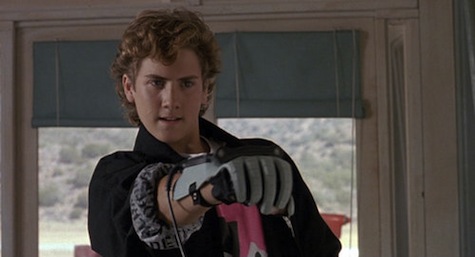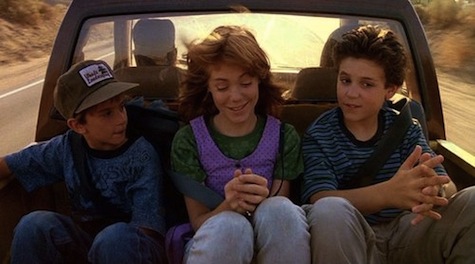Calling The Wizard nothing more than a 100-minute commercial for Nintendo would only be partially accurate. It’s a 100-minute commercial for lots of other things, too. The way in which it goes about being this craven, strictly pecuniary beast is truly something to behold. The Wizard is a very bad movie in ways few bad movies dare to even attempt.
One is in over-estimating the appeal of its lead. I’m pretty sure there was, because I was there, but I still need to ask: was there ever a time when people legitimately thought Fred Savage was cool? He always had passable comic timing and was more fluent with text than most kid actors, but whenever he’d have those “I’m so cool” moments it came off even funnier than when he tried to be funny. The reason The Wonder Years worked (well, one of them) was because he wasn’t trying to be cool, ditto The Princess Bride (which he also, mercifully, was barely in). And while Savage’s “I’m so cool” moment in The Wizard—a quasi-self-parodying moment in which a be-sunglassed Savage pulls a miniature Sinatra routine asking a casino cocktail waitress for licorice that was a little too quasi- and not enough self-parodying—is pretty bad, it’s brief and by no means the biggest problem in the movie.
Nor, surprisingly, is the relentless Nintendo hard-sell. The story exists as an engine to get Fred Savage’s withdrawn, gamer-savant manqué half-brother to the big video game competition in California, via the time-honored tradition of the road movie. Along the way they meet a girl (Jenny Lewis….yes, the Jenny Lewis) who becomes an ally and friend, subsequently discover the brother’s preternatural ability to instantly play any Nintendo game as though he had been playing it every day for a year, and try to stay one step ahead of the pickup-truck riding comedy team of Christian Slater (older brother) and Beau Bridges (father), and the massively creepy private detective/bounty hunter who’s been tasked by the Evil Stepfather to bring them back home.
The PI or bounty hunter or whoever he’s supposed to be is the movie’s biggest problem. I don’t remember him being as creepy when I was a kid—at which time he was just a bumbling villain—as he seems now. As an adult, though, I found myself really icked out (technical term) by the way he was portrayed, which was as some random guy who’s way too interested in these little kids. Still, there was a possibility that this was projection, reading too much into something with a more modern, cynical perspective….until the scene in the casino when Jenny Lewis shrieks, “He touched my breast!” And suddenly what was subtext became text.
That recurring bit of ick ends up overwhelming all the movie’s other problematic aspects, like the fact that there are no dramatic stakes at all—and, oddly, seemingly no police in the entire western United States—and the fact that even the movie’s raison d’etre—to sell Nintendo consoles and games—is mishandled, in that the existence of video games is introduced abruptly, and the movie keeps changing its mind about their cultural impact. At one point, they’re so omnipresent that truck stop diners have NES consoles built into their tables and old traveling salesmen are such avid gamers that they’ll gamble on arcade games. At another point, video games are such a novelty that we follow Christian Slater and Beau Bridges on the path from “what is this strange magic” to “I’m on level 4! I have the scroll weapon and have been pulling an all-nighter trying to beat this boss!” Were the marketing strategy a bit more unified (or, in other words, if they’d cared enough to make an actual movie) the wildly overblown unveiling of Super Mario Bros 3 as dramatic climax would play better. Yes, it would still be a commercial, but it wouldn’t be as compulsively giggle-inducing as it is here.
Speaking of which, “I love my Power Glove…it’s so bad” may be the most unintentionally hilarious movie line of the entire 80s, considering what a horrendous piece of crap the Power Glove was in actuality.

Lest this entire rewatch come off as negative, one thing The Wizard does fairly well is convey the intense monomania of becoming engrossed in gaming. Of course, it was in the interests of the commercial—ahem, movie—to make playing video games look awesome and something that everyone should play. This still doesn’t negate the fact that the movie does portray the draw of gaming with a fair degree of sympathy, if not accuracy. And the filmmaking is competently professional, if nothing anything even approaching great. But there’s no way around it: The Wizard is a really bad movie that leaves an uncomfortable aftertaste.
Danny Bowes is a New York City-based film critic and blogger.










